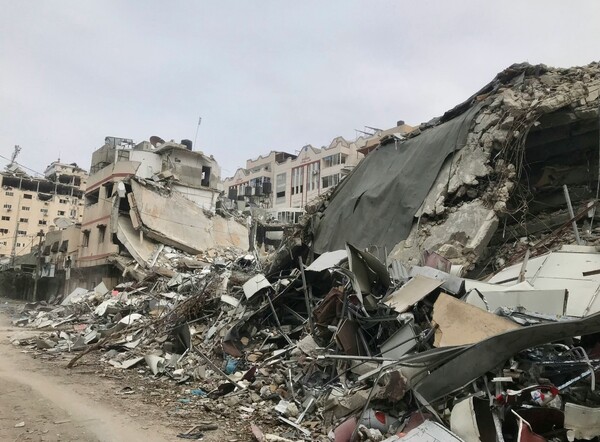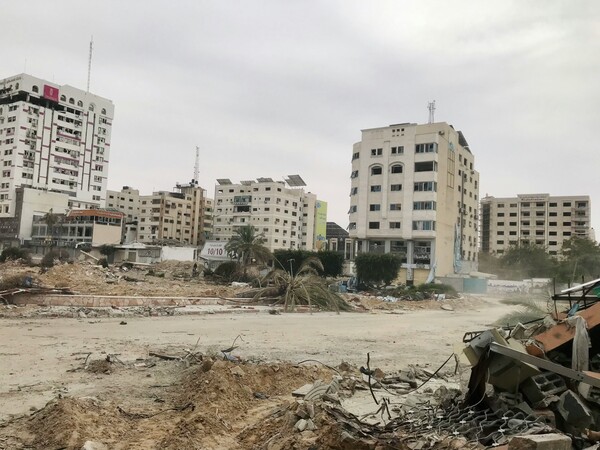
NGOs, or non-governmental organizations, operate independently of government structures, and work for the public good, especially in conflict zones. However, more than 500 Palestinians have been killed while seeking aid since Gaza Humanitarian Foundation(GHF) started operating in late May. Thus, more than 170 charities and other NGOs are calling for the controversial aid distribution scheme in Gaza run by GHF.
Distributing aid in Gaza becomes controversial topic
On July 1st, over 200 humanitarian NGOs, including Oxfam and Save the Children, issued a joint statement titled “Gaza: Starvation or Gunfire – This Is Not a Humanitarian Response.” The organizations demanded an immediate suspension of the current aid distribution system in Gaza, which is led by the U.S-and Israeli-backed Gaza Humanitarian Foundation (GHF), and called for the restoration of a United Nations-led aid mechanism. According to the statement, the situation in Gaza has rapidly deteriorated since the Israeli military barred UN agencies from distributing aid in March, citing concerns that Hamas might divert resources for military use. In response, Israel authorized GHF to take over aid distribution. However, humanitarian groups report that this shift has had deadly consequences.
GHF aid control sparks deadly consequences
In the weeks following GHF’s takeover of operations on May 26th, chaos and violence have erupted around the foundation’s limited number of distribution sites. Previously, there were over 400 aid centers across Gaza, the GHF now operates only four: three in the far southwest and one in central Gaza. As a result, roughly two million hungry civilians are converging on just a few locations, overwhelming the system and sparking desperate and dangerous scenes. In less than a month, 583 Palestinians have reportedly been killed while trying to access aid, including 408 deaths near GHF distribution points alone. In addition, over 4,000 have been injured while attempting to collect food, according to the NGOs. The groups allege that Israeli soldiers and armed groups affiliated with the Israeli military are firing upon unarmed civilians in these areas. Israel denies its soldiers deliberately shoot at aid recipients and says the GHF's system provides direct assistance to those in urgent need.
The joint statement says the GHF is violating norms of humanitarian work
The statement further urged the international community to take concrete steps to protect civilians’ right to humanitarian aid. Since the GHF started operating in Gaza, there have been almost daily reports of Israeli forces killing people seeking aid at these site. The NGOs demanded that governments stop funding military operations that violate international law, and that they support the return of a UN-led coordination mechanism based on international humanitarian principles.
The current situation in Palestine is worsening
“Today, Palestinians in Gaza face an impossible choice: starve or risk being shot while trying desperately to collect food to feed their families,” the NGOs warn in their joint statement. Orphans and caregivers are among the dead, with children harmed in over half of the attacks on civilians at these sites. Meanwhile, lawlessness is spreading. With little access to food and growing despair, starving civilians have reportedly looted aid trucks and warehouses. Humanitarian groups with a longstanding presence in Gaza argue that the U.S.- and Israeli-controlled aid system is fundamentally inhumane.

GHF’s response to criticism and need for alternatives
GHF is facing growing pressure to clarify its role and responsibility in the recent incidents. Although GHF spokesperson insists “We’ve delivered more than 52 million meals in just five weeks. Not talking points, not headlines, but food reaching Palestinian families every single day.”, critics argue that a lack of coordination and proper risk assessment contributed to the deadly outcomes. In addition, the GHF said in response to the Israeli newspaper Haaretz that “there have been no incidents or fatalities at or in the immediate vicinity of any of our distribution sites.” As the war continues in the long term, international NGOs and civil society groups are urging GHF to provide a transparent explanation of its operational procedures. Without such reforms, experts warn that trust in humanitarian missions could be deeply undermined.
The Gaza Strip has long been the epicenter of humanitarian crisis, but the recent situation highlights one of its darkest chapters. In the worsening humanitarian crisis in Gaza, it is clear that the current aid system is failing to protect civilians and maintain basic human dignity. The repeated attacks on aid seekers and the breakdown of law call for immediate international intervention. NGOs demand a complete rethinking of how the world responds to suffering in conflict zones.

